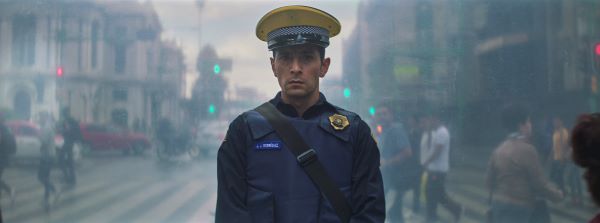
Rising Mexican filmmaker Alonso Ruizpalacios, better known for his acclaimed feature films (Güeros and Museo are highly recommended), has made his first non-fiction work. It tackles the subject of corruption in Mexico City’s police system and how an ordinary cop experiences his/her job daily. It offers a daring proposition: you may have some good apples in a basket full of rotten ones, but if they all end up rotten, why care about them at all? The director doesn’t provide clear answers. He seems more focused on the questions themselves while experimenting with the medium. A Cop Movie presents a baroque blend of documentary and reenactments that call in to question every captivating image, every emotional testimony.
The movie starts with 34-year-old Teresa, a 17-year veteran member of the police force. She has followed her policeman father’s footsteps, and is now in the middle of a delicate situation: she must assist in a childbirth. While Teresa is not prepared to do so, there is no guarantee that the ambulance will arrive on time. Handheld camera movements, sweaty and concerned faces all around, sounds that belong to the agitated night: the film depicts the delivery in a raw and direct manner. It’s hard to suspect initially that we are watching one of the many re-creations, instead of real-time action. Often in voice-over, but also speaking directly to the camera during her shift, Teresa describes her experiences working a thankless and underpaid job. She has some small victories though: she’s proud of having demonstrated to her father that she could become a cop despite his doubts.
Shortly, the film changes focus to another “real-life” character: Montoya, the boyfriend of Teresa. He became a cop after becoming inspired by his brother. Throughout his segment, the artificiality begins to become apparent until its intentional dramatization is revealed. For example, in one of his assignments, Montoya monitors a gay pride parade, and he faces a crowd that mocks the policeman and dances around him. If by then you haven’t notice yet (many testimonies are spoken in front of the camera with an obvious lip sync), the fact that there are no violent repercussions or retaliations from the police force should be enough of a clue for the viewer to suspect that this is not exactly how it happened. It’s doubtful for the LGBT community to get away with provoking the police in Mexico (or almost any Latin American country for that matter).
About midway, Mónica del Carmen and Raúl Briones present themselves as the actors we earlier saw impersonating Teresa and Montoya. The real-life couple also appear, providing more testimonies sitting in their living room. Ruizpalacios gives equal attention to those interviews and their cinematic re-creations as well as to the process of the actors Briones and del Carmen preparing for their roles: they both enlisted in a police academy. In one of the most insightful testimonies, Briones reflects on the fact that almost anyone could become a cop in six months. It’s a field that attracts low-income candidates, often uneducated and desperate to work (many of them are single mothers).
Meanwhile, the real-life Teresa and Montoya don’t present themselves as role models; they openly admit they took bribes from everyday people regularly. They also denounce the unfair reprisal against them after Teresa worked with the wrong person (a politician), which lead to a vendetta to break the couple’s spirit and force them to renounce their actions. As a result, they were assigned to the worst possible job for cops accustomed to action: long shifts in areas where absolutely nothing happens.
A Cop Movie discloses fascinating data on police routines. Officers have to pay quotas from the moment they start working every day in order to not receive damaged or broken equipment, including guns and the patrol car. Taking in consideration the portrayed experience of Teresa and Montoya, the film finally embraces the idea of change as something unattainable. Corruption won’t end. As soon as you become a cop, you’re part of the system as an accomplice.
What is confounding is the director’s constant playing with the form and structure, which obscures the likelihood that viewers probably already knew about the rampant corruption; the movie certainly doesn’t challenge the negative preconception many have toward the police in Mexico (and Latin America). It’s also unclear why Ruizpalacios has chosen this particular subject and approach. While engaging to a certain degree, the film’s exercise in style disguises how uninteresting, in terms of drama, the actual cops are to justify a feature film.






Leave A Comment